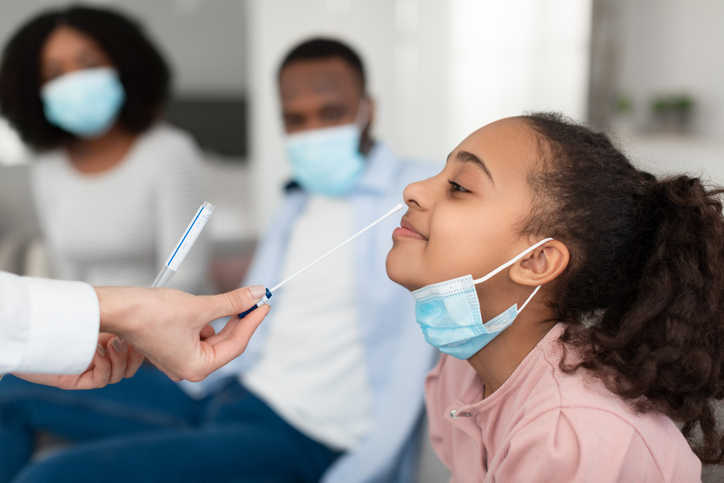By Emma Dugas and Liz Madison, Vitals contributors
Dr. Mercedes Kwiatkowski offers three main themes when helping kids through a positive COVID test
• Preparation and education
• Age-appropriate communication and information-sharing
• Good modeling of behavior
Tests can be intimidating, but what about those tests where you can’t even study?
Dr. Mercedes Kwiatkowski, child psychiatrist with Palo Alto Medical Foundation in the Bay Area, explains that preparation can still play a critical role with kids and COVID-19 testing. She offers some suggestions on how to approach the process and manage a potential positive test result.
Preparing Pre-Test
Dr. Kwiatkowski suggests that parents and guardians try to normalize the testing process as much as possible. They can help remove the mystery around testing by explaining the “why” behind the test. For example, adults can tell children tests are necessary because COVID is increasing in the community. Providing kids a play-by-play about where or how the test will be conducted—whether at home or school or via nasal swab or saliva—can also ease their concerns. They can further help manage young ones’ expectations by letting them know they could test positive.
“We used to be so afraid of getting it. Our experience now is that it’s so prevalent the likelihood of positive test is increased,” she said.
COVID-19 tests are the gateway to many activities and outings. Dr. Kwiatkowski and her family recently planned a ski trip. From the beginning, she explained to her 7- and 9-year-olds that if they don’t have COVID, they would proceed with the trip. They also had conversations about if anyone in the family tested positive and developed a back-up activity.
“Kids like to be involved. Framing the situation is super important, it can help if you present it with a flexible mindset,” she said. “This can help kids learn that they have to plan ahead and prepare to reach a goal. They can also learn that if things don’t work out, they’ll be okay.”
A fellow friend’s positive diagnosis can also provide an opportunity to prepare. Dr. Kwiatkowski suggests that parents or guardians can reassure children that things are okay by channeling the young ones’ anxiety with “altruistic action.” For example, the child can deliver a card to the friend while they are in isolation and hopefully see that their friend is not terribly ill.
“This can help kids avoid feeling powerless in the face of all this uncertainty,” she said. “Uncertainty evokes more anxiety than pain.”
Through it all, Dr. Kwiatkowski suggests it is important to continually communicate with kids and directly hear from them. She said parents may be surprised.
“I thought my son would be worried about getting sick, but he told me he was actually worried about missing recess,” she said with a laugh.
Managing a Positive Test Result
Dr. Kwiatkowski reassures caregivers that they have already laid a good foundation for managing expectations—it will just continue into this phase. She suggests informing children about common symptoms, isolation requirements and how a positive result will impact other longer-term responsibilities like schoolwork. Structure can also provide reassurance and balance during the isolation period. Dr. Kwiatkowski proposes introducing different activities that fill a similar slot in a child’s day, i.e., replacing recess with a walk in the neighborhood for younger kids or dedicating time to homework for adolescents.
“All humans, but especially kids, like structure and predictability,” she said.
The creative arts are another way to focus kids’ time and energy during isolation. Journaling, artwork or crafts are all meaningful ways to work through feelings. Dr. Kwiatkowski also recommends creating a memory box or time capsule of a child’s time in isolation. Parents and guardians can remind children they are living through a unique time in history that they may want to reflect on in the future.
“This way you are making the most of the moment, taking action instead of being powerless,” she said. “This effort can help a child’s current and future self.”
Dr. Kwiatkowski explains that guardians can reassure children if they express concern over infecting other family members. She says it is helpful not to assign blame. Rather, adults can emphasize how the family is in this together and explain the roles everyone will take in the situation. It also can be a time to explain the part vaccination plays in lessening symptoms and overall illness for all those eligible to receive them.
Emerging from Quarantine
At last—the young person is healthy again and the isolation period is over. Now what? Dr. Kwiatkowski says this time can serve as an opportunity to regroup and assess how kids are feeling emotionally. She suggests asking young people how they would like to talk about their quarantine with their friends. If kids don’t wish to share details, Dr. Kwiatkowski suggests that parents remind them their illness isn’t a shameful thing. At the same time, they can role play and act out conversations about how they wish to present the information, i.e., “I was just sick” or “I got to walk my dog every day while in quarantine! It was so fun.”
Falling behind in school is one of the bigger sources of anxiety for older kids. Dr. Kwiatkowski suggests reminding older students that their efforts to stay on track with schoolwork while in quarantine can ease the transition back into their regular school schedule.
Thinking ahead, planning and preparing are not only strategies that can help your children get through a COVID test, they’re the antidotes to anxiety that Dr. Kwiatkowski hopes young people will learn from the pandemic overall.
Note: This content is not intended to be a substitute for professional medical advice, diagnosis or treatment. Always seek the advice of your physician or other qualified health provider with any questions you may have regarding a medical condition. Never disregard professional medical advice or delay in seeking it because of something you have read on this website.




